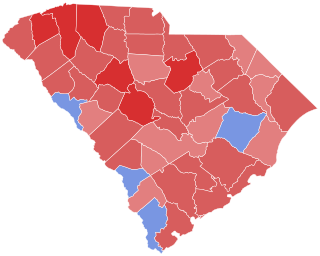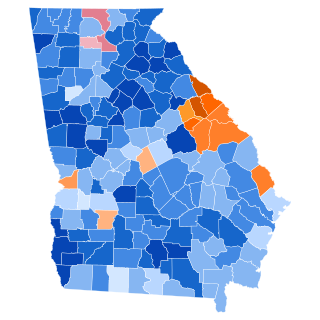Related Research Articles

James Strom Thurmond Sr. was an American politician who represented South Carolina in the United States Senate from 1954 to 2003. Before his 48 years as a senator, he served as the 103rd governor of South Carolina from 1947 to 1951. Thurmond was a member of the Democratic Party until 1964 when he joined the Republican Party for the remainder of his legislative career. He also ran for president in 1948 as the Dixiecrat candidate, receiving over a million votes and winning four states.

Macon is a city in Noxubee County, Mississippi along the Noxubee River. The population was 2,768 at the 2010 census. It is the county seat of Noxubee County.

The States' Rights Democratic Party was a short-lived segregationist political party in the United States, active primarily in the South. It arose due to a Southern regional split in opposition to the national Democratic Party. After President Harry S. Truman, the leader of the Democratic Party, ordered integration of the military in 1948 and other actions to address civil rights of African Americans, including the first presidential proposal for comprehensive civil and voting rights, many Southern white politicians who objected to this course organized themselves as a breakaway faction. They wished to protect the ability of states to maintain racial segregation. Its members were referred to as "Dixiecrats", a portmanteau of "Dixie", referring to the Southern United States, and "Democrat".

In American politics, the Southern strategy was a Republican Party electoral strategy to increase political support among white voters in the South by appealing to racism against African Americans. As the civil rights movement and dismantling of Jim Crow laws in the 1950s and 1960s visibly deepened existing racial tensions in much of the Southern United States, Republican politicians such as presidential candidate Richard Nixon and Senator Barry Goldwater developed strategies that successfully contributed to the political realignment of many white, conservative voters in the South who had traditionally supported the Democratic Party. It also helped to push the Republican Party much more to the right relative to the 1950s. By winning all of the South a presidential candidate could obtain the presidency with minimal support elsewhere.

Rubel Lex Phillips was an American politician and lawyer. He grew up poor in Alcorn County, Mississippi, and graduated from the University of Mississippi School of Law. Hailing from a politically active family and initially a member of the Democratic Party, he served as a circuit court clerk from 1952 to 1956 and chaired the Mississippi Public Service Commission from 1956 to 1958. In 1962 Phillips joined the Republican Party. He ran as a Republican in the 1963 Mississippi gubernatorial election, the first person to do so since 1947. Supporting a platform of racial segregation and opposition to the presidential administration of John F. Kennedy, he lost, garnering only 38 percent of the vote.
New South, New South Democracy or New South Creed is a slogan in the history of the American South first used after the American Civil War. Reformers used it to call for a modernization of society and attitudes, to integrate more fully with the United States as a whole, reject the economy and traditions of the Old South, and the slavery-based plantation system of the prewar period. The term was coined by its leading spokesman, Atlanta editor Henry W. Grady in 1874.

The Mississippi Democratic Party is the affiliate of the Democratic Party in the state of Mississippi. The party headquarters is located in Jackson, Mississippi.

The 1990 South Carolina United States Senate election was held on November 6, 1990 to select the U.S. Senator from the state of South Carolina. Popular incumbent Republican U.S. Senator Strom Thurmond cruised to re-election against Democratic challenger Bob Cunningham.

Pillow Academy (PA) is an independent, co-educational college preparatory school in unincorporated Leflore County, Mississippi, near Greenwood. It was founded by white parents in 1966 as a segregation academy to avoid having their children attend school with blacks.
This is a selective bibliography of conservatism in the United States covering the key political, intellectual and organizational themes that are dealt with in Conservatism in the United States. Google Scholar produces a listing of 93,000 scholarly books and articles on "American Conservatism" published since 2000. The titles below are found in the recommended further reading sections of the books and articles cited under "Surveys" and "Historiography." The "Historiography" and "Critical views" section mostly comprise items critical or hostile of American conservatism.

The 1948 United States presidential election in Georgia took place on November 2, 1948, as part of the wider United States presidential election. Voters chose 12 representatives, or electors, to the Electoral College, who voted for president and vice president.
Presbyterian Christian School (PCS), is a private Christian school in Hattiesburg, Mississippi. It was originally founded as Bay Street Christian Day School in 1976. It serves preschool through grade 12. Grades K5-6 attend one campus, while 7-12 attend an adjacent campus.
The black-and-tan faction was a biracial faction in the Republican Party in the South from the 1870s to the 1960s. It replaced the Negro Republican Party faction's name after the 1890s.

The 1948 United States presidential election in Mississippi took place on November 2, 1948, in Mississippi as part of the wider United States presidential election of 1948.

The 1959 Mississippi gubernatorial election took place on November 3, 1959, in order to elect the Governor of Mississippi. Incumbent Democrat James P. Coleman was term-limited, and could not run for reelection to a second term. As was common at the time, the Democratic candidate ran unopposed in the general election so therefore the Democratic primary was the real contest, and winning the primary was considered tantamount to election.

The 1968 United States presidential election in Mississippi was held on November 5, 1968. Mississippi voters chose seven electors, or representatives to the Electoral College, who voted for President and Vice-President. During the 1960s, the Civil Rights Movement dictated Mississippi's politics, with effectively the entire white population vehemently opposed to federal policies of racial desegregation and black voting rights. In 1960, the state had been narrowly captured by a slate of unpledged Democratic electors, but in 1964 universal white opposition to the Civil Rights Act and negligible black voter registration meant that white Mississippians turned almost unanimously to Republican Barry Goldwater. Goldwater's support for "constitutional government and local self-rule" meant that the absence from the ballot of "states' rights" parties or unpledged electors was unimportant. The Arizona Senator was one of only six Republicans to vote against the Civil Rights Act, and so the small electorate of Mississippi supported him almost unanimously.

The 1948 United States presidential election in Florida was held on November 2, 1948. Voters chose eight electors, or representatives to the Electoral College, who voted for president and vice president.
Henry Minor Faser was an American academic administrator, life insurance business executive and political activist. He was the founding dean of the University of Mississippi School of Pharmacy, the vice president of the Lamar Life Insurance Company, and a supporter of the States' Rights Democratic Party's 1948 presidential campaign.
Florence Carson Sillers Ogden was an American newspaper columnist, socialite, conservative political activist, and segregationist. She wrote the column Dis 'n' Dat for the Delta Democrat Times in Greenville and The Clarion-Ledger in Jackson, where she commented on political, social, and economic issues in the United States. A member of a prominent Mississippi family, Ogden was an active member of multiple women's organizations including the Daughters of the American Revolution and the United Daughters of the Confederacy, and was a founding member of Women for Constitutional Government. She used her social influence to organize conservative political movements in Mississippi, promote women's involvement in politics, and defend white supremacy. Ogden was an avid supporter of the White Citizens' Councils, criticized liberal shifts in the National Council of Churches, opposed immigration reform, and publicly denounced the U.S. Supreme Court's ruling in Brown v. Board of Education. A Dixiecrat, she pushed for conservative agendas within the Democratic Party and contributed to the Republican Party's shift to political and cultural dominance in the Deep South.

On August 28, 1957, Strom Thurmond, then a Democratic United States senator from South Carolina, began a filibuster intended to prevent the passage of the Civil Rights Act of 1957. The filibuster—an extended speech designed to stall legislation—began at 8:54 p.m. and lasted until 9:12 p.m. the following day, a duration of 24 hours and 18 minutes. This made the filibuster the longest single-person filibuster in United States Senate history, a record that still stands as of 2024. The filibuster focused primarily on asserting that the bill in question, which provided for expanded federal protection of African American voting rights, was both unnecessary and unconstitutional, and Thurmond recited from documents including the election laws of each U.S. state, Supreme Court decisions, and George Washington's Farewell Address. Thurmond focused on a particular provision in the bill that dealt with certain court cases, but opposed the entirety of the bill.
References
- 1 2 3 "Joseph Crespino". Department of History. Emory University. Retrieved September 30, 2017.
- ↑ Leah Wright Rigueur (28 December 2014). The Loneliness of the Black Republican: Pragmatic Politics and the Pursuit of Power. Princeton University Press. pp. 362–. ISBN 978-1-4008-5243-7.
- ↑ Sean Cunningham; Sean P. Cunningham (30 June 2014). American Politics in the Postwar Sunbelt: Conservative Growth in a Battleground Region. Cambridge University Press. pp. 44–. ISBN 978-1-107-02452-6.
- ↑ Brett Gadsden (8 October 2012). Between North and South: Delaware, Desegregation, and the Myth of American Sectionalism. University of Pennsylvania Press. pp. 257–. ISBN 978-0-8122-0797-2.
- ↑ Jason Morgan Ward (2011). Defending White Democracy: The Making of a Segregationist Movement and the Remaking of Racial Politics, 1936-1965. Univ of North Carolina Press. pp. 188–. ISBN 978-0-8078-3513-5.
- ↑ Joseph Crespino, "Atticus Finch Offers a Lesson in Southern Politics," New York Times, July 16, 2015.